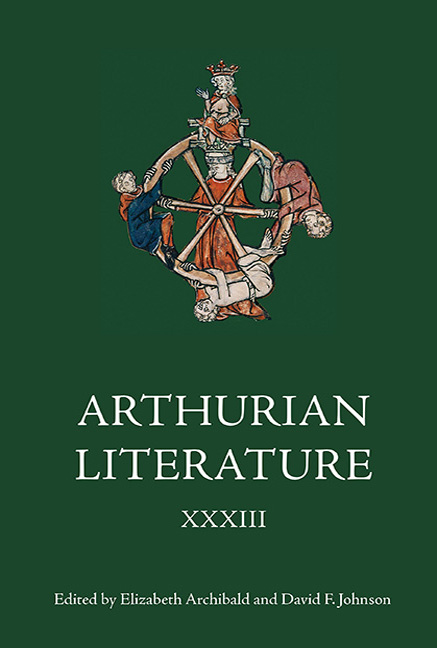Book contents
- Frontmatter
- Contents
- General Editors’ Foreword
- Contributors
- I From ‘The Matter of Britain’ to ‘The Matter of Rome’: Latin Literary Culture and the Reception of Geoffrey of Monmouth in Wales
- II ChrÉtien's British Yvain in England and Wales
- III Edward III's Abandoned Order of the Round Table Revisited: Political Arthurianism after Poitiers
- IV ‘Thanked Be God There Hath Been But A Few Of Myne Auncytours That Hathe Dyed In Their Beddes’: Border Stories and Northern Arthurian Romances
- V T. H. White's Representation of Malory's Camelot
- VI The Old Knight An Edition of the Greek Arthurian Poem of Vat. Gr. 1822
- Miscellaneous Endmatter
- Commentary
- Contents of Previous Volumes
II - ChrÉtien's British Yvain in England and Wales
Published online by Cambridge University Press: 29 July 2017
- Frontmatter
- Contents
- General Editors’ Foreword
- Contributors
- I From ‘The Matter of Britain’ to ‘The Matter of Rome’: Latin Literary Culture and the Reception of Geoffrey of Monmouth in Wales
- II ChrÉtien's British Yvain in England and Wales
- III Edward III's Abandoned Order of the Round Table Revisited: Political Arthurianism after Poitiers
- IV ‘Thanked Be God There Hath Been But A Few Of Myne Auncytours That Hathe Dyed In Their Beddes’: Border Stories and Northern Arthurian Romances
- V T. H. White's Representation of Malory's Camelot
- VI The Old Knight An Edition of the Greek Arthurian Poem of Vat. Gr. 1822
- Miscellaneous Endmatter
- Commentary
- Contents of Previous Volumes
Summary
Introduction:
British elements in a literary text in the English language
The relevance of British and Celtic elements to the literature written in the English language has been highlighted by Peter Clemoes: ‘To read Medieval Welsh literature alongside that of Middle English is to understand for oneself the nature of the debt which English literature owes to the Celtic countries for the inspiration of the Arthurian legend.’ Here, I examine the presence of British Arthur and Owein in a Middle English romance, namely in Ywain and Gawain. Chrétien comes into my title because the Middle English Ywain and Gawain is derived by a process of transfer and adaptation from Chrétien's Yvain, and it is of course a critical commonplace that ‘Chrétien's romances draw on already existing materials, notably motifs of Celtic origin assimilated to an essentially Latin culture.’ In Yvain, for example, Chrétien acknowledges that Arthur was ‘li buens rois de Bretaingne’ (the good King of Britain) and locates his court ‘a Carduel an Gales’ (at Carlisle in Wales) – ‘Gales’ here including Strathclyde, the British kingdom of north-west England and south-west Scotland, the ‘Old North’ from a Welsh perspective.
Ywain and Gawain, Owein and Chrétien's Yvain
Among Arthurian narratives in Middle English, Ywain and Gawain has a special position, as it is ‘the only surviving romance in Middle English that was quite certainly translated directly from an original by Chrétien de Troyes’. For all the freedom with which the translator treated his source, as we will see, it is still much closer to Yvain than the other Middle English adaptation of a work by Chrétien, Sir Perceval of Galles, is to Perceval. The reference to Gawain in the title has been explained in terms of the romance's celebration of the close companionship between Ywain and Gawain, as well as by Gawain's appeal for Middle English authors and audiences more generally, culminating in the late-fourteenth-century Sir Gawain and the Green Knight.
Ywain and Gawain is thought to have been composed in the fourteenth century, perhaps between 1325 and 1350, in a ‘Northern [dialect] with some admixture of North-East Midland forms’; it is extant in only one manuscript, London, British Library, Cotton Galba E ix, written in a hand ‘belonging to the first quarter of the fifteenth century’.
- Type
- Chapter
- Information
- Arthurian Literature XXXIII , pp. 29 - 69Publisher: Boydell & BrewerPrint publication year: 2016



